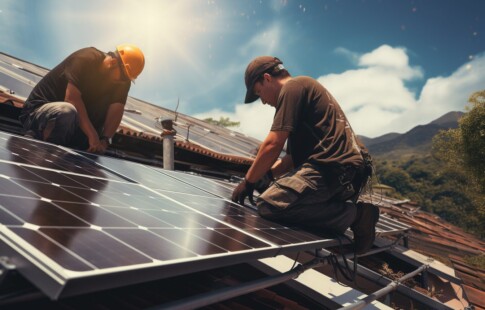
Geothermal Energy Advantages
We are reader-supported. When you buy through links on our site, we may earn affiliate commission.
Geothermal energy comes from within the earth’s crust. It’s a natural resource that is good for the environment. It is used to heat, cool and generate electricity for homes. Wells are dug into underground reservoirs to access the steam and hot water. Here are a few geothermal energy advantages.
1. It’s Eco-Friendly
One of the main geothermal energy advantages is it’s better for the environment than fossil fuels. It uses natural resources from the earth. It also has a lower carbon footprint, reducing the impact of climate change.
Geothermal energy does emit some pollutants, but not as much as fossil fuels. Burning fossil fuels emits about 33 billion tonnes of carbon dioxide annually. It also increases health risks, such as respiratory infections or heart disease.
2. It’s a Renewable Source
Geothermal energy is a renewable source that comes from the earth. It will be around until the planet is gone. The resource prevents overusing nonrenewable sources, like natural gas. Also, it protects the next generation and ensures they have enough natural resources.
The other advantage is that this energy is more affordable due to its abundance. It’s also then easier to produce, lowering manufacturing and labor expenses.
3. It Has a High Potential
We currently don’t use the resource’s full potential. One of the geothermal energy advantages is its untapped possibilities. With ongoing research and development, the source can become even more efficient. Getting government investment for projects can help develop more affordable and productive solutions.
New technology, such as smart devices, can help with this expansion. It’s estimated that geothermal power plants can produce between 0.0035 and 2 terawatts of energy.
4. It’s a Stable Source
It provides a more reliable source than other nonrenewables, such as solar. Since it comes from an underground source, it’s not dependent on the weather. The ground temperature is less affected by seasonal changes than the air. Therefore, the energy is available almost 24/7.
So, this is a more convenient source to heat and cool houses effectively. The stability also makes the production process more accessible and affordable. Engineers can even better predict the total power output. On the other hand, solar energy is only efficient when the sun is visible.
5. It Doesn’t Require Fuel
Since geothermal energy is naturally occurring, it doesn’t require fuel. This helps to reduce our carbon footprint and keep the air clean. When carbon is released, it traps heat in the atmosphere, leading to global warming.
Also, geothermal energy production doesn’t rely on mining which can disrupt habitats. However, nonrenewable sources, use extensive labor and equipment.
6. The Energy Source Is Constantly Evolving
There is a lot of exploration in this field currently. Also, technology is being created to streamline processes. It can help with monitoring, modeling and automation projects.
Contractors can use sensors and artificial intelligence (AI) to monitor systems. Automation can assist in remote drilling processes. Improving the industry could reduce the current challenges, such as location restrictions.
7. The Systems Are More Energy-Efficient
Geothermal heat pumps use 25%-50% less electricity than conventional systems. So, they can heat and cool a room faster while using fewer resources. They also have a flexible design that can be adjusted to any situation.
This also limits the amount of hardware needed, so the device takes up less space. A more efficient system can also save money. A geothermal pump reduces production costs and lowers utility bills.
8. There Is Less Maintenance Required
Geothermal pumps last longer since they have fewer moveable parts. Also, these components are shattered inside a building protected from the elements. You can also save on replacement costs and cleaning supplies with fewer parts. Although, some heat pumps also have higher warranties.
To keep up maintenance, ensure you use the right thermostat. Consider a wired one rather than a battery-driven thermostat. Also, regularly change the filters and check the condensation pans for standing water.
9. The Systems Are Quieter
Geothermal power plants can produce lower noise levels. Construction may require some noise, but after that, it’s a relatively silent process. Even larger power stations have reduced noise levels but still are efficient.
So, you can enjoy family time without having to talk over a loud device. Also, it’s more convenient if your neighbors have young children.
10. It Can Create More Jobs
Geothermal energy creates more indirect employment than any other type of renewable source. In fact, we currently have 3,187 megawatts of installed geothermal generating capacity. So, there is plenty of room for job growth. Producing the energy requires labor for production, installation and research. The new job creation can help grow our economy and help people support their families.
Here are a few jobs within the industry you could look into:
- Science jobs
- Engineering roles
- Drilling occupations
- Construction workers
- Plant operator
Top Geothermal Energy Advantages
Renewable energy sources are currently a hot topic. Using these can help to reduce our carbon footprint and save the environment. Geothermal energy is a good source offering reliability and efficiency. So, consider these geothermal energy advantages when deciding how to power your home.
Share on
Like what you read? Join other Environment.co readers!
Get the latest updates on our planet by subscribing to the Environment.co newsletter!
About the author
Jane Marsh
Starting from an early age, Jane Marsh loved all animals and became a budding environmentalist. Now, Jane works as the Editor-in-Chief of Environment.co where she covers topics related to climate policy, renewable energy, the food industry, and more.





